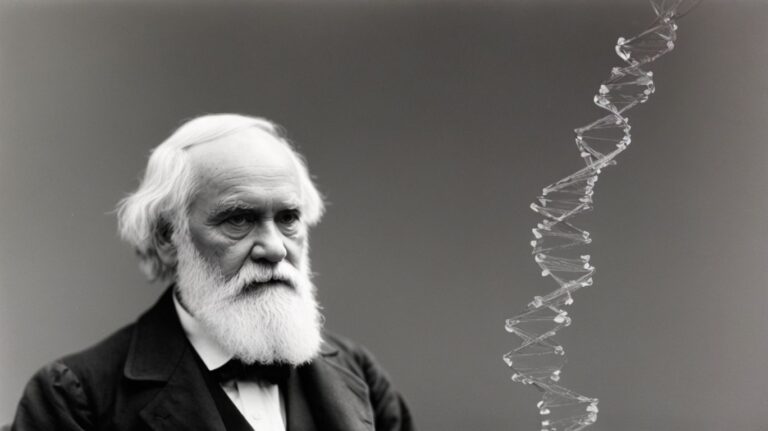Humanistic psychology is a branch of psychology that focuses on the study of the whole person, emphasizing individual growth and self-actualization. Founded by renowned psychologists Abraham Maslow and Carl Rogers, this approach emphasizes concepts such as self-concept, empathy, and free will.
Over time, humanistic psychology has evolved, integrating with other theories and finding contemporary applications. In this article, we will explore the key principles of humanistic psychology, its evolution, and the benefits it offers in understanding human behavior and promoting personal growth and well-being.
Contents
- 1 What Is Humanistic Psychology?
- 2 Who Were the Founders of Humanistic Psychology?
- 3 What Are the Key Principles of Humanistic Psychology?
- 4 How Has Humanistic Psychology Evolved Over Time?
- 5 What Are the Benefits of Humanistic Psychology?
- 6 Frequently Asked Questions
- 6.1 What is the Evolution of Humanistic Psychology?
- 6.2 How did Humanistic Psychology emerge?
- 6.3 Who were the key figures in the Evolution of Humanistic Psychology?
- 6.4 What are some key concepts in Humanistic Psychology?
- 6.5 How has Humanistic Psychology evolved over time?
- 6.6 What impact has the Evolution of Humanistic Psychology had on the field of psychology?
What Is Humanistic Psychology?
Humanistic psychology is a branch of psychology that emphasizes a holistic view of human behavior, focusing on personal growth, self-awareness, and the exploration of human potential.
Central to humanistic psychology is the belief that individuals have an innate drive towards self-actualization, a concept introduced by Abraham Maslow in his hierarchy of needs. This approach rejects the deterministic views of behaviorism and the clinical focus of psychoanalysis. Instead, it highlights the importance of subjective experiences and the uniqueness of every individual.
Humanistic psychologists such as Carl Rogers emphasized the significance of empathy and unconditional positive regard in therapy, promoting a client-centered approach that values the individual’s subjective reality. The person-centered therapy developed by Rogers remains a cornerstone of humanistic practice, fostering a supportive and non-judgmental environment for personal growth.
Through its emphasis on human potential and the promotion of self-actualization, humanistic psychology has contributed to positive psychology and existential psychology, reshaping the landscape of mainstream psychological thought and practice.
Who Were the Founders of Humanistic Psychology?
Abraham Maslow and Carl Rogers are recognized as the key founders of humanistic psychology, pioneering the humanistic approach towards understanding human behavior and fostering personal growth.
Both Maslow and Rogers emphasized the importance of self-actualization and self-concept in their work. Maslow’s hierarchy of needs, which prioritized physiological, safety, love, esteem, and self-actualization needs, highlighted the progression towards fulfilling one’s potential. On the other hand, Rogers’ client-centered therapy focused on creating a supportive and empathetic environment for clients to achieve personal growth through self-exploration and acceptance.
Their influence extended beyond psychology, impacting fields such as education, business, and counseling. Maslow’s concept of peak experiences and Rogers’ emphasis on unconditional positive regard continue to shape therapeutic practices and personal development approaches today.
Abraham Maslow
Abraham Maslow, known for his hierarchy of needs theory, was a prominent figure in humanistic psychology, advocating for self-actualization as a key element in personal growth and fulfillment.
Abraham Maslow, an American psychologist born in 1908, developed his renowned theory of the hierarchy of needs, which has profoundly influenced psychology and self-help fields.
His upbringing in a Russian Jewish immigrant family instilled in him a curiosity about human behavior and motivation, leading to his groundbreaking work in psychology.
Maslow highlighted the importance of individuals striving towards realizing their full potential, embodying what he termed as self-actualization, which refers to achieving personal growth, creativity, and maximizing one’s capabilities.
His theory emphasized that individuals must satisfy basic needs such as physiological, safety, love, and esteem before progressing to the pinnacle of self-actualization.
Carl Rogers
Carl Rogers, a pioneer of client-centered therapy, revolutionized humanistic psychology by emphasizing empathy, genuineness, and unconditional positive regard in therapeutic relationships.
His approach prioritized the client’s subjective experience, encouraging self-exploration and personal growth within the therapeutic setting. Rogers believed that individuals have an innate drive towards self-actualization, the realization of one’s full potential. Through reflective listening and non-directive techniques, he aimed to create a safe space for clients to express their thoughts and emotions freely. This emphasis on self-awareness and personal responsibility has had a profound impact on psychological well-being, fostering a sense of enablement and autonomy in individuals seeking therapy.
What Are the Key Principles of Humanistic Psychology?
The key principles of humanistic psychology encompass self-actualization, personal growth, self-concept, empathy, and the belief in free will as essential components of individual well-being and development.
Self-actualization, often considered the pinnacle of humanistic psychology, refers to the realization of one’s potential and the pursuit of personal fulfillment. It emphasizes the importance of authenticity and living in line with one’s values and true self. Personal growth, another fundamental principle, entails continuous improvement, learning, and striving towards becoming the best version of oneself.
The concept of self-concept delves into how individuals perceive themselves, including their thoughts, beliefs, and feelings about their identity. Empathy, a cornerstone of humanistic psychology, involves understanding and sharing others’ emotions, fostering deeper connections and relationships.
The belief in free will asserts that individuals have the power to make choices and shape their own destiny, highlighting autonomy and responsibility in navigating life’s challenges and opportunities.
Self-Actualization
Self-actualization, a concept popularized by Abraham Maslow, refers to the realization of one’s full potential and the pursuit of personal growth and fulfillment.
Within the context of humanistic psychology, self-actualization is seen as the ultimate goal of human development, where individuals strive to become the best version of themselves. It involves a deep understanding of one’s strengths, weaknesses, values, and beliefs, and the alignment of actions with one’s innermost desires and aspirations.
Self-actualized individuals exhibit a strong sense of autonomy, creativity, and authenticity in their behaviors, choosing paths that are in line with their true essence. According to Maslow, self-actualization is a continuous journey of personal growth marked by self-awareness, acceptance, and the pursuit of meaningful experiences.
Personal Growth
Personal growth, at the core of humanistic psychology, involves continuous self-improvement, self-awareness, and the pursuit of self-realization to achieve one’s highest potential.
In the realm of humanistic psychology, individuals navigate a journey towards a deeper understanding of oneself, seeking to unlock their true essence and capabilities. This exploration goes beyond mere surface-level improvements, looking into the essence of what makes each person unique and valuable. By embarking on this quest for self-discovery and enhancement, individuals cultivate a fulfilling life that aligns with their authentic selves and aspirations.
Within this process, self-awareness serves as a guiding beacon, illuminating areas for personal development and growth.
Self-Concept
Self-concept, the perception individuals have of themselves, plays a crucial role in humanistic psychology, emphasizing the uniqueness and individuality of each person.
Humanistic psychology places a strong emphasis on self-actualization and the inherent drive towards personal growth and fulfillment. Self-concept is intertwined with this belief, as it influences how individuals perceive their abilities, values, and potential.
Understanding one’s self-concept involves introspection and self-reflection, leading to a deeper awareness of one’s strengths, weaknesses, and aspirations. This process is pivotal in shaping personal identity and cultivating a sense of authenticity.
In humanistic philosophy, self-concept is viewed as dynamic and evolving, influenced by experiences, relationships, and societal influences.
Empathy
Empathy, the ability to understand and share the feelings of others, is a fundamental component of humanistic psychology, promoting emotional connections and psychological well-being.
In the context of humanistic psychology, empathy plays a crucial role in creating a supportive and nurturing environment where individuals feel heard and understood. By demonstrating empathy, individuals can build deep emotional connections, enhancing their sense of belonging and self-worth.
Moreover, empathy is a cornerstone in therapeutic relationships, as it allows therapists to connect with their clients on a profound level, fostering trust and mutual understanding. This empathetic bond is essential for the therapeutic process, enabling clients to explore their emotions and experiences in a safe and validating space.
Free Will
Free will, the belief in individual agency and choice, is a cornerstone of humanistic psychology, emphasizing the ethical responsibility and autonomy of individuals in shaping their lives.
This concept explores the idea that individuals have the power to make decisions independent of environmental, genetic, or societal influences, leading to the pursuit of self-determination.
The belief in free will suggests that individuals are not merely products of their circumstances but have the capacity to act intentionally and meaningfully in their lives. Humanistic psychology emphasizes the importance of acknowledging personal agency, as it influences personal autonomy and ethical decision-making.
The existence of free will raises philosophical questions about personal responsibility and the nature of moral choices.
How Has Humanistic Psychology Evolved Over Time?
Humanistic psychology has evolved over time, transcending its origins to work together with other psychological theories, gain recognition in mainstream psychology, and find contemporary applications in diverse fields.
Beginning in the mid-20th century, humanistic psychology emerged as a response to the limitations of behaviorism and psychoanalysis. It emphasized the uniqueness of the individual, focusing on personal growth, self-actualization, and subjective experiences. Prominent figures such as Abraham Maslow and Carl Rogers played pivotal roles in shaping this approach. Despite its positive reception, humanistic psychology also faced criticism for its perceived lack of empirical evidence and potential for subjective interpretations. Its emphasis on human potential and intrinsic worth has influenced therapeutic practices, education, and organizational psychology, expanding its reach beyond traditional clinical settings.
Criticisms of Early Humanistic Psychology
Early humanistic psychology faced criticisms for its perceived lack of scientific rigor, emphasis on subjective experiences, and limited empirical evidence, especially from behaviorism and psychoanalysis.
One of the primary criticisms directed towards early humanistic psychology was its subjective nature, as it focused more on individuals’ self-perceptions and inner experiences rather than observable behaviors or unconscious processes.
This approach led to skepticism regarding the replicability and generalizability of findings, which are cornerstone principles in the scientific method. Critics argued that without robust empirical evidence and control over variables, humanistic psychology lacked the reliability and objectivity required for scientific validation.
Integration with Other Theories
Humanistic psychology has integrated with other psychological theories such as transpersonal psychology, synthesizing diverse perspectives to offer a comprehensive understanding of human behavior and experience.
Transpersonal psychology, often viewed as the spiritual dimension of human psychology, broadens the lens through which behaviors and experiences are analyzed, allowing for deeper exploration into the interconnected nature of consciousness and self-awareness. By combining elements of humanistic psychology with transpersonal perspectives, a more holistic approach is taken towards addressing psychological phenomena, emphasizing not only the individual but also the collective and universal aspects of human existence.
Contemporary Applications
Humanistic psychology continues to find contemporary applications in diverse fields, including education, counseling, organizational psychology, and personal development, showcasing its positive impact on individual well-being and growth.
In the realm of education, humanistic psychology emphasizes student-centered approaches that foster intrinsic motivation and self-directed learning, nurturing a more holistic view of students as unique individuals.
Within counseling, this perspective facilitates a deeper understanding of clients’ subjective experiences, promoting empathy, acceptance, and authentic connection.
In organizational psychology, the principles of humanistic psychology promote a positive work environment focusing on employee well-being, satisfaction, and personal growth, ultimately enhancing overall organizational effectiveness.
What Are the Benefits of Humanistic Psychology?
Humanistic psychology offers numerous benefits, including a focus on personal growth and well-being, an emphasis on individual experience and subjectivity, and a holistic approach to understanding human behavior and development.
By prioritizing the individual’s unique experiences and inner feelings, humanistic psychology fosters a deeper understanding of one’s emotions and motivations.
Through client-centered therapy techniques, individuals feel heard, valued, and enableed in their journey towards self-discovery and self-actualization.
This approach encourages individuals to tap into their inner resources, cultivate resilience, and enhance their self-acceptance and self-awareness, leading to greater life satisfaction and fulfillment.
Focus on Personal Growth and Well-Being
Humanistic psychology places a strong focus on fostering personal growth and enhancing well-being, encouraging individuals to strive for self-improvement, fulfillment, and emotional wellness.
Within the realm of humanistic psychology, individuals are encouraged to embark on a journey of self-discovery and introspection, uncovering their inner potential and striving for a more authentic and meaningful existence. This approach emphasizes the importance of self-awareness and acceptance, guiding individuals towards a deeper sense of purpose and connection with themselves and others. By nurturing positive self-regard and exploring one’s values and beliefs, humanistic principles pave the way for greater resilience and inner harmony.
Emphasis on Individual Experience and Subjectivity
Humanistic psychology values individual experience and subjectivity, acknowledging the uniqueness of each person’s perspective, emotions, and responses to the world.
In contrast to more traditional psychological approaches, which often focus on observable behaviors or unconscious processes, humanistic psychology places a strong emphasis on the subjective experiences of individuals. This approach values personal growth, self-actualization, and the inherent worth of each person. By considering the rich tapestry of human emotions, thoughts, and motivations, humanistic psychology aims to provide a more holistic understanding of human behavior and the complexities of the human mind.
Holistic Approach to Understanding Human Behavior
Humanistic psychology adopts a holistic approach to understanding human behavior, considering emotional, spiritual, and growth dimensions alongside environmental influences to provide a comprehensive overview of individual experiences.
This approach views each person as a whole being, with intrinsic value and potential for personal growth and self-actualization. Humanistic psychology emphasizes the importance of individual agency and the belief that individuals strive towards fulfillment and realization of their unique capacities. By focusing on subjective experiences and personal narratives, this psychological perspective aims to explore the depths of human existence beyond mere surface behaviors.
- Through therapeutic methods such as client-centered therapy and existential therapy, humanistic psychologists facilitate self-discovery and self-awareness, promoting a deep understanding of the self and fostering emotional well-being.
- The emphasis on personal responsibility and autonomy encourages individuals to take charge of their own lives and make choices that align with their values and beliefs.
Frequently Asked Questions
What is the Evolution of Humanistic Psychology?
The Evolution of Humanistic Psychology refers to the development and changes that have occurred within the field of humanistic psychology over time.
How did Humanistic Psychology emerge?
Humanistic Psychology emerged as a reaction to the dominant approaches of behaviorism and psychoanalysis in the mid-20th century. It focused on the potential of individuals to reach their highest potential and emphasized the importance of personal growth and self-actualization.
Who were the key figures in the Evolution of Humanistic Psychology?
Some of the key figures in the Evolution of Humanistic Psychology include Abraham Maslow, Carl Rogers, Rollo May, and Fritz Perls. These psychologists played a significant role in shaping the principles and theories of humanistic psychology.
What are some key concepts in Humanistic Psychology?
Some key concepts in Humanistic Psychology include self-actualization, personal growth, free will, and the importance of the individual’s subjective experience. These ideas reject the deterministic approach of behaviorism and emphasize the role of the individual in shaping their own experience.
How has Humanistic Psychology evolved over time?
Humanistic Psychology has evolved to include various subfields such as existential psychology, transpersonal psychology, and positive psychology. It has also incorporated concepts from other disciplines, such as mindfulness and spirituality, to broaden its scope.
What impact has the Evolution of Humanistic Psychology had on the field of psychology?
The Evolution of Humanistic Psychology has had a significant impact on the field of psychology by providing a human-centered and holistic approach to understanding human behavior. It also paved the way for the development of other humanistic-based therapies and continues to influence modern psychology.




